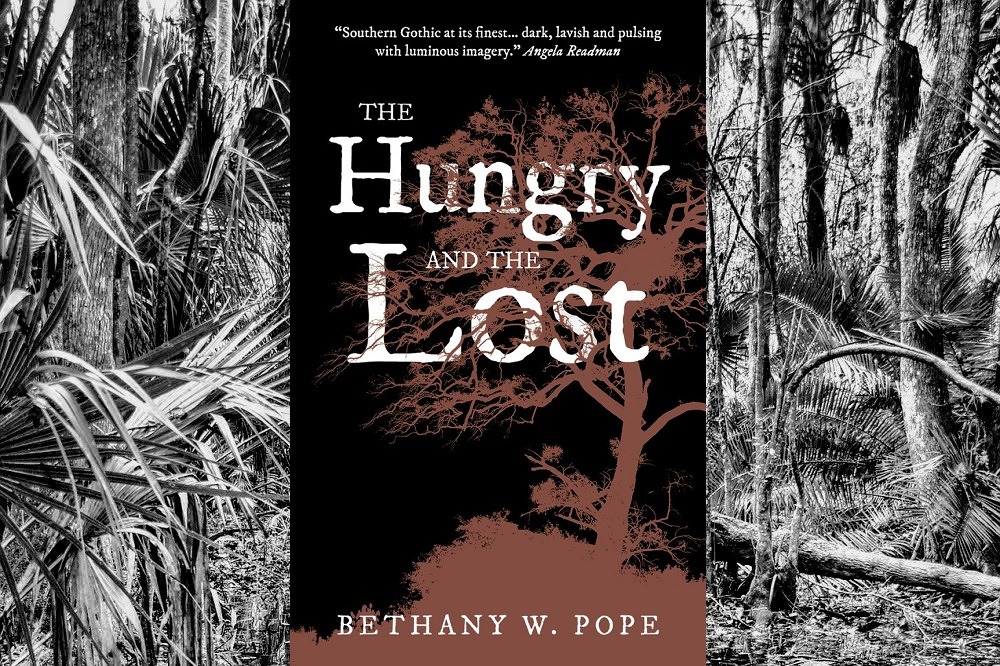Review: The Hungry and The Lost – reader, beware!

Debbie Marshall
There is life here, of a kind, a half-life at least. And, if you are strong enough to follow, you shall feel its raging pulse.
With these words in the prologue to The Hungry and the Lost, the unnamed narrator is giving us fair warning. And I do the same: reader, beware! Enter this world only if you are ready to plummet into a nightmare Southern Gothic universe, set in the slime and ooze of the Florida swamplands at the turn from 19th to 20th century.
If you have the stomach for it, hold onto your hat, preferably one without feathers, and prepare for a wild ride through a seesaw world of madness, magic, mayhem and myth as good, evil and a platoon of coyotes converge for a battle to the death.
Bethany W. Pope’s second novel after Masque (2016) charts the epic struggles of the very hungry and very lost Joy-Marie after the loss of the three people who hold her world together. The death of her beloved father from a messy, consumptive illness leads to the collapse of her mother, the beautiful, spooky Rose, who freefalls into the dark, mind-splitting breakdown that has been prefigured throughout the account of their marriage, and the tragic departure of the housemaid Malda, once but no longer a slave and hopelessly in love with Joy’s father. Age ten, Joy shoulders the burden of keeping herself and Rose alive in horrific circumstances and through her story, Pope delivers a complex, multi-layered narrative of resistance and survival against the odds.
Transgressive
The setting is a nameless town located 30 miles, but seemingly worlds away, from the relative civilisation of Tampa. Thirty years of rapid growth, wealth and imported wives begin to dwindle as the flocks of birds on which the town relies are hunted with impunity and brutality for their feathers to the point of extinction, and the town begins to die alongside them.
Pope mirrors this decline on an individual level through the death of Joy’s father, who exits this world just as the last of the townspeople are packing their bags to leave for better prospects elsewhere. At the same time, she draws a link with the decimation of the vast herds of buffalo further north, wiped out by greed and the encroachment of a new breed of humans into an ancient, native landscape. This ability to capture different angles through a single narrative is masterful and provides a range of entry points and interpretations for the reader.
Left behind by this exodus from the town, Joy and her mother flounder in the mouldering damp and decay of a house built on stilts, perched just out of reach of the ever-encroaching swamp. We follow Joy’s often fruitless and lonely search for food and warmth, her only comfort provided by escape into the books in her father’s library. Pope plays with time, which seems to pass both slowly and quickly, and it is not giving anything away to say that she succeeds in reaching adulthood. Here, the focus shifts towards a wider set of internal and external threats and opponents as the novel gradually opens out into a mythological fight of good against evil, centred around the neighbours from hell (possibly quite literally), the predatory and demonic Johnson family.
Pope has documented her own traumatic history in poetry collections such as Silage (2017) and the same combination of poetry and trauma is apparent here, but from more of a sideways slant. In interviews, she has discussed the influence on the novel of her immersion in the work of psychologist Carl Jung and in particular his pupil Marie-Louise Von Franz’s Shadow and Evil in Fairy Tales. This plays out to great effect in Pope’s use of myth, symbols, dreams, mirror worlds and religious imagery to build an enclosed world cut off from ‘reality’, a twisted fairytale that invites analysis as an internal, psychological journey up and out of the primordial ooze of buried trauma, pain and loss.
Gothic literature is arguably a genre that allows so-called civilised people to look at so-called uncivilised things, the unspeakable secrets, transgressive thoughts, desires, and impulses that are pushed down below the surface. Pope’s own background of growing up in the American south enables her to deliver authentic Southern Gothic and its dealings with the unspoken legacy of slavery, racism and patriarchy that pushes back and up to the surface. Truth will out, just as the corpses in the town’s churchyard rise to the surface eventually – even the lead-lined coffins cannot hold them down.
The Hungry and the Lost by Bethany W. Pope is published by Parthian and you can buy a copy here…
Support our Nation today
For the price of a cup of coffee a month you can help us create an independent, not-for-profit, national news service for the people of Wales, by the people of Wales.






